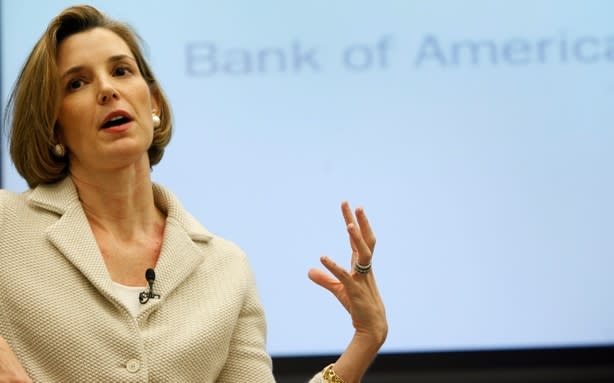Five Best Thursday Columns

Ezra Klein in Bloomberg View on Republicans and universal health care For decades, Klein writes, both parties shared the desire to achieve universal health care coverage; they just disagreed on the means. Today, Mitt Romney's proposals are likely to reduce coverage. "In part, this is because the Republican Party continues to be in opposition mode. Having jettisoned their support for the individual mandate in order to fight a Democratic bill with the mandate at its core, Republicans simply have no policies that could plausibly lead to universal coverage," Klein writes. [U]nlike in past elections ... voters this year will choose between one party that supports universal health care and one that doesn't, with health insurance for as many as 50 million voters hanging in the balance."
RELATED: Five Best Thursday Columns
Sallie Krawcheck in The Washington Post on women in finance Krawcheck, a former Bank of America executive, uses The Atlantic's cover story as occasion to discuss diversity in the financial sector. "[W]ith all the debate our nation has had on how to reduce risk in our large banks and avoid a repeat of the industry's violent boom-and-bust cycle, a real discussion has never taken place on diversity in the financial sector," Krawcheck writes. Studies show that women often approach risk more cautiously, and focus better on the long-term -- qualities the banks could use. The downturn, she says, has accelerated a homogeneous management's tendency to promote those that resemble them. "One could also argue that emerging from the economic downturn with even more homogeneous management teams is a big fail."
RELATED: Five Best Wednesday Columns
Michael Gerson in The Washington Post on Romney's unambitious strategy Mitt Romney approached the Supreme Court's ruling on Arizona's immigration law as he's approached the entire immigration issue during the general election campaign: cautiously. "Romney is being careful and reasonable on immigration in the midst of a five-alarm political fire. Latino support for Republicans has been dropping since conservatives blocked President George W. Bush’s attempt at comprehensive immigration reform," Gerson writes. Obama's campaign has many flaws, but its ability for "ambitious repositioning," as with his recent decision on deportations, should worry Romney. "[I]t should concern Republicans that the Romney campaign has shown little appetite for strategic boldness," he says. "This absence of strategic ambition may reflect a strategy -- that the election should be only a referendum on the Obama economy. If so, it is a serious mistake."
RELATED: Five Best Wednesday Columns
Dambisa Moyo in The New York Times on China's African 'colonialism' Secretary of State Hillary Clinton warned of a "new colonialism" in Africa at a time when China has become the continent's biggest trading partner. "Since China began seriously investing in Africa in 2005, it has been routinely cast as a stealthy imperialist with a voracious appetite for commodities and no qualms about exploiting Africans to get them," writes Moyo. "[T]he evidence does not support a claim that Africans themselves feel exploited. To the contrary, China's role is broadly welcomed across the continent." We should still look out for human rights and environmental abuses, but Moyo argues that China's investment and job creation will allow citizens to financially support their governments, forcing their leaders, in turn, to be accountable.
RELATED: Five Best Monday Columns
Michael Kinsley in the Los Angeles Times on Tom Friedman in Europe New York Times columnist Tom Friedman opened a recent column, as he often does, with a question he says people often pose to him. "Traveling in Europe last week, it seemed as if every other conversation ended with some form of this question: Why does it feel like so few leaders are capable of inspiring their people to meet the challenges of our day?" Friedman wrote. Kinsley, doubtful that this is the case, writes a searing parody of the conversations Friedman must have had in Europe to elicit this kind of question at the end (not the beginning) of half his conversations. In each case, it's Friedman who asks the question, and his conversation partner -- a concierge, a London psychologist, etc. -- who immediately declares the dialogue finished. "Future research," he writes, "will concentrate on the 50% of European conversations that apparently don't end with any form of the question about leadership and challenges and inspiring the people."
